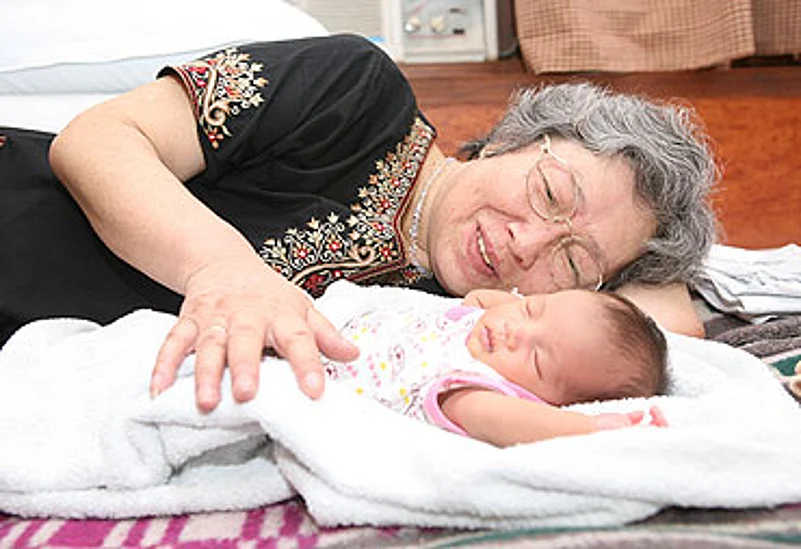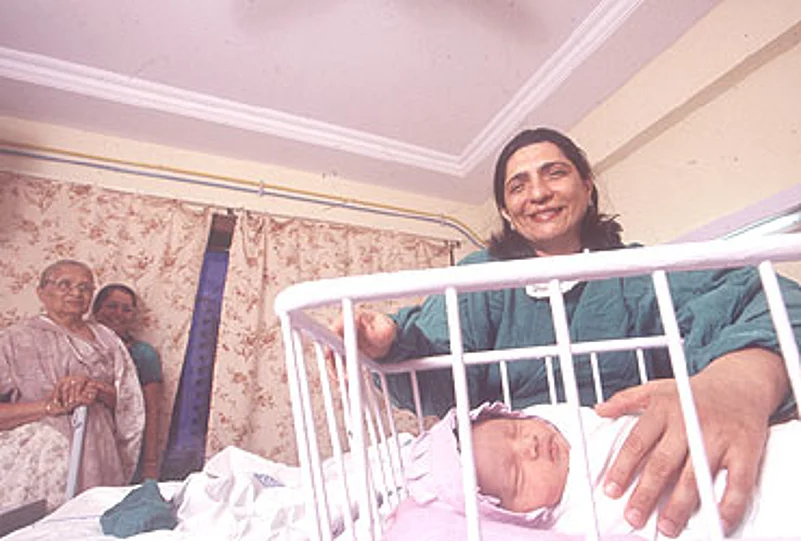- The abortion law is finally being reviewed, but in other areas of reproductive health too, the law lags behind advances in medical science
- Surrogacy is governed only by guidelines, which offer no legal protection to either surrogate mothers or genetic parents. Fraud and exploitation are rampant.
- In-Vitro Fertilisation (IVF), in the absence of regulatory laws, is open to ethical and medical malpractice
- Cord-blood banking too is unlicensed and not covered by law
***

This gaping chasm, at its cruellest extreme, is Mira Parikh's story. Tests in weeks 26, 28 and 30 revealed that Parikh's baby had a fistula between the food and wind pipe, that the left leg was shorter than the right one, and that there was hydrocephaly or water in the brain. Parikh wanted to abort a baby that would be born mentally retarded, but the law would not permit it. At 34 weeks, Parikh went into premature labour. The newborn boy needed intensive care but Mira chose the general ward. The fistula meant that when he suckled, milk entered his lungs. Mira refused to sign for the immediate surgery that was required. For a week, the baby survived on fluids provided intravenously. Then, the hospital served Mira an ultimatum: authorise surgery or take the baby home. She chose the latter. Still unable to suckle and deprived of his IV supply, he died.
"My hair still stands on end when I think of this case," says her gynaecologist, who requested anonymity. "For three years after that, Mira battled depression. All this was avoidable had the law permitted late abortion."
Abortion is not the only area of reproductive medicine begging legal review. While the Niketa case was capturing headlines, baby Manji became another tragic symbol of obsolete laws. Born to an Indian surrogate mother, Manji represented a legal conundrum. Her Japanese parents, Dr Ikufumi and Yuki Yamada, hired the services of an Ahmedabad woman as surrogate mother last year, but during the pregnancy the couple got divorced. Law requires genetic parents like Yuki and Ikufumi to legally 'adopt' the baby from its surrogate mother; but post-divorce, Yuki refused to adopt. And, Indian laws forbid a single father from taking a child's custody.
"This issue can be circumvented with a clear surrogacy law that allows for the names of biological parents on the birth certificate," suggests Dr Duru Shah, former president of the Federation of Obstetric and Gynaecological Societies of India (FOGSI). As things stand, surrogacy is governed by the Indian Council of Medical Research (ICMR) guidelines, which hardly have any legal standing. When surrogate mother Barkhaben Kapadia went into labour, the hospital put her name on the baby's birth certificate. The genetic parents, Nina and Rohan Lal, waved the ICMR guidelines at the hospital authorities. "Show us a law," they were told. Next, the Lals approached the Bombay Municipal Corporation. "Come back with a court order," said an officer. The Lals then had to cart the baby off to Bihar to shop for a fraudulent birth certificate.
The surrogate mother is vulnerable but legally unprotected. Her security and health are dependent on the surrogacy clinic—or presiding doctor—and a contract, if one is drawn up, between herself and the genetic parents. In Anand,
Dr Nayana Patel—known as the surrogacy queen—handles about 20 to 25 cases a month. "I take care to protect the surrogate," she claims, underscoring the fact that a highly sensitive arrangement is so doctor-dependent. Patel says the ICMR guidelines need clarification on certain issues, such as whether close relatives can play surrogate. The guidelines recommend no more than three surrogacies in a lifetime, and a physical separation of the surrogate and genetic parents. They also stipulate that the ideal age of a surrogate mother should be between 21 years and 45 years. But these are often observed in the breach.
The Walavalkars—successful US-based IT professionals in their mid-30s—were married for seven years but childless. Eventually, they decided on surrogacy back in India. The initial procedure over, they returned to their jobs in the US while the surrogate lived in Mumbai. The contract drawn up between them proved useless, as their gynaecologist found out. "They neither paid the surrogate mother's medical expenses beyond the fifth month, nor did they respond when we tried, desperately, to contact them," she recalls. The surrogate completed her term and delivered a healthy boy. The gynaecologist found, through her personal network, that the couple had separated during the pregnancy. The baby was given to an orphanage. And the surrogate got precious little for her entanglement in the case.
"I have come across so many cases where poor women are exploited for surrogacy, both by their husbands and clinics who procure their services. Where do these women go for redressing such issues?" asks a Mumbai-based medico-legal expert.
Arm-twisting can also take another form. Take Nikita Gupta, childless for almost 10 years after marriage. She and her husband headed to Anand. Through their chosen clinic, they found a surrogate and closed the deal for a handsome amount plus all medical costs. But the husband of the surrogate saw an opportunity in the well-heeled Guptas. Through the second trimester, he demanded more money. The Guptas gave in. Another demand followed; the Guptas gave in again. In the last month, he threatened to sell the child away if the Guptas did not part with an additional two lakhs. Their backs against the wall, they gave in yet again.
"It was a stroke of luck that he was away when she went into labour (before the due date) and the clinic sorted it out. We returned to Mumbai with our baby," smiles Nikita. But if things had gone wrong, she would have had no legal recourse at all.
The lag between law and medical breakthroughs is also felt acutely in the cutting-edge field of in-vitro fertilisation (IVF). Here too, there are only ICMR guidelines, but they are bare-bone, putting the onus on the practitioner's ethics. Patients come in with requests—twins, triplets, transfer of more embryos to increase pregnancy chances, "a baby with my aunt's blue eyes" and so on. But with scarcely any regulation on the number of embryo transfers per IVF cycle, cost of a cycle, and redressal forum for disgruntled parents, many IVF clinics indulge in outrageous malpractices.
"IVF clinics can easily become high-end designer baby shops," agrees Dr Firuza Parikh, IVF specialist and director of the Department of Assisted Reproduction and Genetics at Mumbai's Jaslok Hospital. "All depends on the ethics of the person at the top." The ICMR guidelines should become law at the earliest, she says, but adds that even the law will have to be amended from time to time "because science-technology and social norms are moving at discordant speeds".

Baby Maker: Many come to IVF specialist Dr Firuza Parikh's clinic asking for a baby
In the legal vacuum, it's only the doctor's "internal self-audit" that acts as the bulwark against malpractices, Parikh says. Another well-known IVF specialist speaks of a Calcutta-based couple who came asking: "Make us a son, or my wife will be thrown out of the house". Technically, it was possible to fertilise embryo for a male child but it presented ethical issues. "I wasn't willing to use IVF as a prenatal selection tool," she says.
Egg and sperm donation throws up equally murky terrain, unregulated by law and open to malpractices. Shah recalls a 22-year-old girl who walked in for egg donation because she "needed the money for a cosmetic surgery". Though Shah counselled her against the procedure, he knew the girl could find another clinic. IVF cycles are costly and clinics hyper-stimulate the donor's ovaries to harvest as many eggs as possible. "An IVF centre might push her ovaries to produce 30 eggs at one time," says Shah. "The donor could die. Where are the monitoring agencies to prevent this?"
Cord blood banking, the bold new area of reproductive medicine, is also without any legal framework. No licence is required to set up a cord blood bank. "We are asked to register with the ICMR which then audits our facilities, but registration is not compulsory and a couple of companies are operating without registration," says Mayur Abhaya, director of Chennai-based Lifecell, India's first private cord blood bank, which has international accreditation and adheres to US norms on storage, retrieval and release of cord blood. Hundreds of urban couples are now choosing to bank their baby's cord blood, at a hefty price, as a form of "life-insurance" (cord blood is a rich source of stem cells). But if they're duped or dissatisfied, they have little legal consolation.
But the wheels of change have finally started moving, thanks to Niketa Mehta's battle. In India few people display faith in the legal system like the Mehtas and their doctor. "I know hundreds of Niketas; all these years I have been doing what is legal for them, but not offering moral justice," says Dr Nikhil Datar, who's also a trained lawyer. "I fought this case not just for Niketa but also for myself." The sooner the law rewards that sort of faith, the better.
(Note: Some names have been changed to protect identity.)


























